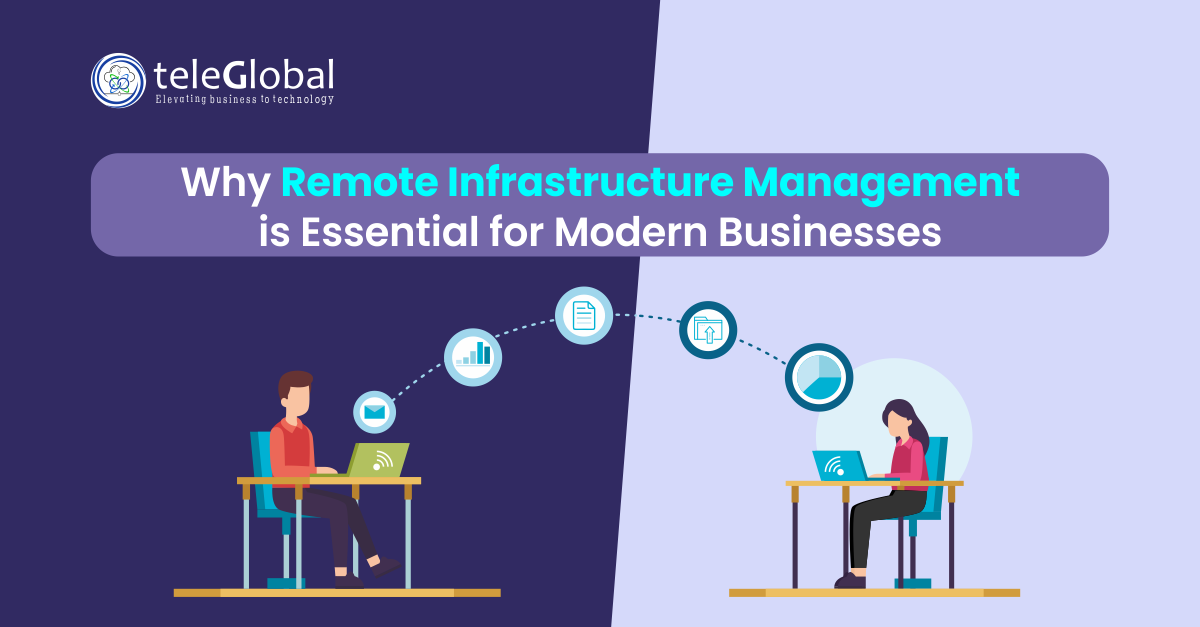
| Author: Abhinita Singh | Published: 11-Jun-2024 |
Technology runs the backbone of every modern business, from small startups in India to global enterprises operating across the UAE, US, and Europe. Downtime, even for a few minutes, can mean lost revenue, damaged customer trust, and stalled operations.
Remote Infrastructure Management (RIM) solves this challenge by enabling companies to manage servers, networks, storage, databases, and security from anywhere. This ensures faster problem resolution, better scalability, and robust security, all without the expense of maintaining large onsite IT teams.
With businesses relying more on cloud consulting services and managed IT services Europe, RIM is no longer an optional upgrade. It’s a strategic necessity.
Remote Infrastructure Management is the process of overseeing and optimising IT systems from a secure offsite location. It combines advanced tools, proactive monitoring, and skilled expertise to ensure uninterrupted operations.
Maintaining a large in-house IT team in high-cost locations like the US or Europe can be expensive. Even in fast-growing markets like India and the UAE, infrastructure costs add up quickly.
By using remote IT infrastructure services, companies reduce operational costs by up to 40% without losing control over system quality. Hardware investments drop, and resources are used more efficiently.
Whether your operations are in Dubai, New York, or London, downtime has no place in a global economy. IT infrastructure monitoring ensures your systems are tracked round-the-clock, with issues fixed before they affect operations. This proactive approach keeps uptime high and productivity steady.
RIM allows businesses in seasonal industries or rapid-growth phases to scale infrastructure without heavy investment. A pay-as-you-go model ensures IT resources grow in sync with demand, ideal for multinational companies operating across India, UAE, US, and Europe.
With cybersecurity services US setting strict compliance benchmarks and data protection rules tightening across Europe and the Middle East, RIM providers build security into every layer of infrastructure. This includes encryption, multi-factor authentication, and real-time threat monitoring.
When IT systems are in expert hands, internal teams can focus on innovation, customer experience, and market expansion instead of reacting to outages or technical issues.
Banking & Finance – Ensures compliance and secure transactions across markets.
Healthcare – Maintains uninterrupted access to patient data and telemedicine platforms.
Manufacturing & Logistics – Supports real-time supply chain visibility.
Retail & E-commerce – Keeps customer-facing platforms online 24/7.
Education – Enables reliable digital learning environments.
Look for a provider with:
Remote Infrastructure Management is now a key driver for operational success, enabling businesses to scale, secure, and optimise their IT systems. Whether your operations are in India, UAE, US, or Europe, the right RIM partner can help you achieve uptime, compliance, and cost savings, all while freeing your teams to focus on growth.
At Teleglobal, we deliver Remote Infrastructure Management, cloud consulting services, and cybersecurity services US to over 900 clients worldwide. With offices across India, UAE, US, and Europe, we combine local insights with global expertise to future-proof your IT operations.
It is the remote monitoring, maintenance, and optimisation of IT systems including servers, networks, and storage using secure tools.
By outsourcing to a specialist, businesses avoid large staffing and hardware expenses while improving efficiency.
Yes. Providers use encryption, firewalls, and continuous monitoring to protect systems against cyber threats.
Yes. It supports on-premises, cloud, and hybrid environments.
Finance, healthcare, manufacturing, retail, and education benefit most due to their high dependency on uptime and secure data.
Choose one with strong regional expertise, 24/7 monitoring, cybersecurity compliance, and multi-cloud capabilities.
